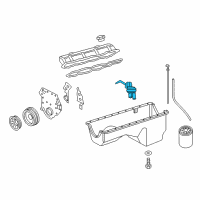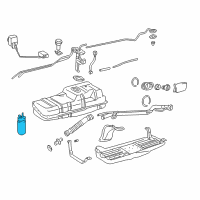Fuel Pump
Select vehicle to guarantee fit
- Department
- Location
- Operation
- Product Fit
- Brands
- Prices


Dorman® Common Rail Fuel Pump
PartNumber: 502-552$743.75Product Specifications- Connector Gender: Female
- Connector Quantity: 1
- Gasket or Seal Included: Yes
- Mounting Hardware Included: No
- Package Contents: 1 Pump
- Port Quantity: 3
- Pump Type: Mechanical
- Terminal Gender: Male
- Terminal Quantity: 2
- Terminal Type: Blade
- UPC: 889245557681
- Wire Quantity: 0
- Wiring Harness Included: No
- Part Description: Common Rail Fuel Pump


Autobest® Fuel Pump Module Assembly
PartNumber: F2637A$207.08Product Specifications- Average Current Draw(A): 7.9
- Average Flow Rating(GPH): 20.9
- Connector Gender: Male
- Connector Quantity: 1
- Connector Shape: Racetrack
- Country of Orign: China
- Fuel Filter Included: No
- Fuel Sending Unit Included: Yes
- Fuel Tank Pressure Sensor Included: Yes
- Gasket or Seal Included: Yes
- Gasket Or Seal Material: NBR
- Grade Type: Performance
- Housing Material: POM
- In Tank or External: In Tank
- Inlet Size: 5/16
- Inlet Type: Quick Connect
- Installation Warnings: No
- Internal Or External Strainer: Internal
- Maximum Pump Pressure (PSI): 64
- Minimum Pump Pressure (PSI): 59
- Mounting Hardware Included: No
- Negative Ground: Yes
- Outlet Quantity: 1
- Outlet Size: 3/8
- Outlet Type: Quick Connect
- Product Height (in): 9
- Product Length (in): 22
- Product Width (in): 17
- Pump Type: Turbine
- Regulator Included: Yes
- Resistance Ohms Empty: 33
- Resistance Ohms Full: 20
- Strainer Included: No
- Terminal Gender: Male
- Terminal Quantity: 6
- Terminal Type: PIN
- UPC: 00072845126375
- Voltage: 12V
- Weight (lbs): 4.49
- Wire Harness Included: No
- Part Description: Fuel Pump Module Assembly


VEMO® Fuel Pump
PartNumber: V30-09-0058$255.08Product Specifications- Height [mm]: 190
- Length [mm]: 315
- Operating Mode: Electric
- Packaging Depth [cm]: 32,2
- Packaging height [cm]: 19
- Packaging width [cm]: 19,8
- Supplementary Article/Supplementary Info: with fuel sender unit
- Weight [kg]: 0,92
- Width [mm]: 185
- Part Description: Fuel Pump


GMB® Mechanical Fuel Pump
PartNumber: 530-8530$173.03Product Specifications- Mounting Hardware Included: 1 PAPER GASKET
- UPC: 083286194625
- Part Description: Mechanical Fuel Pump
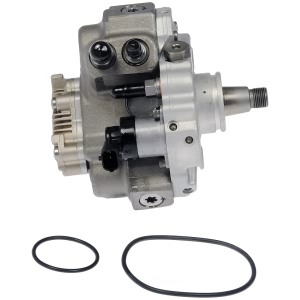

Dorman® Common Rail Fuel Pump
PartNumber: 502-554$651.39Product Specifications- Connector Gender: Female
- Connector Quantity: 1
- Gasket or Seal Included: Yes
- Mounting Hardware Included: No
- Package Contents: 1 Pump
- Port Quantity: 3
- Pump Type: Mechanical
- Terminal Gender: Male
- Terminal Quantity: 2
- Terminal Type: Blade
- UPC: 889245557902
- Wire Quantity: 0
- Wiring Harness Included: No
- Part Description: Common Rail Fuel Pump
OEM (Genuine) Fuel Pump
PartNumber: F6TZ-9350-A$181.92 MSRP:$255.56You Save: $73.64 (29%)Product Specifications- Other Names: Fuel Pump
- Item Dimensions: 12.4 x 12.2 x 8.1 inches
- Item Weight: 3.00 Pounds
- Fitment Type: Direct Replacement
- Part Description: Fuel Pump


Autobest® Fuel Pump Module Assembly
PartNumber: F2820A$148.34Product Specifications- Average Current Draw(A): 9.4
- Average Flow Rating(GPH): 34.1
- Connector Gender: Male
- Connector Quantity: 1
- Connector Shape: Rectangle
- Country of Orign: China
- Fuel Filter Included: Yes
- Fuel Sending Unit Included: Yes
- Fuel Tank Pressure Sensor Included: Yes
- Gasket or Seal Included: Yes
- Gasket Or Seal Material: NBR
- Grade Type: Performance
- Housing Material: POM
- In Tank or External: In Tank
- Inlet Size: 5/16
- Inlet Type: Quick Connect
- Installation Warnings: No
- Internal Or External Strainer: Internal
- Maximum Pump Pressure (PSI): 65
- Minimum Pump Pressure (PSI): 55
- Mounting Hardware Included: No
- Negative Ground: Yes
- Outlet Quantity: 1
- Outlet Size: 3/8
- Outlet Type: Quick Connect
- Product Height (in): 9.06
- Product Length (in): 12.48
- Product Width (in): 9.69
- Pump Type: Turbine
- Regulator Included: Yes
- Resistance Ohms Empty: 250
- Resistance Ohms Full: 40
- Strainer Included: Yes
- Terminal Gender: Male
- Terminal Quantity: 4
- Terminal Type: PIN
- UPC: 00072845128201
- Voltage: 12V
- Weight (lbs): 3.28
- Wire Harness Included: No
- Part Description: Fuel Pump Module Assembly
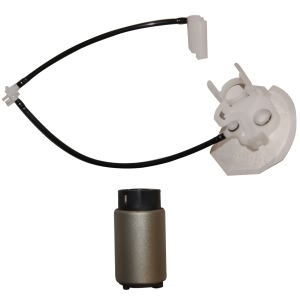

GMB® Fuel Pump and Strainer Set
PartNumber: 570-1060$65.09Product Specifications- Fuel Sending Unit Included: No
- Fuel Type: Gasoline
- UPC: 083286171466
- Part Description: Fuel Pump and Strainer Set


Dorman® Fuel Tank Sending Unit
PartNumber: 2630310$186.10Product Specifications- Connector Color: Gray
- Connector Gender: Female
- Connector Shape: Flat Plug
- Height: 388 mm
- Housing Length: 256 mm
- Housing Material: Plastic (Polyoxymethylene)
- Housing Width: 126 mm
- Lock Ring Included: No
- Maximum Flow Rating: 110 LPH
- Maximum Pressure: 0.037 MPA
- OE Part Number: 5014318AE
- Outlet Diameter: 9.5 mm
- Outlet Quantity: 1
- Outlet Type: Male
- Seal Included: Yes
- Terminal Gender: Female
- Terminal Quantity: 4
- Terminal Type: Spade
- Universal Or Specific Fit: Specific
- UPC: 747214303106
- Width: 6.35 mm
- Wire Gauge Measurement: 16 Awg
- Wire Quantity: 4
- Part Description: Fuel Tank Sending Unit
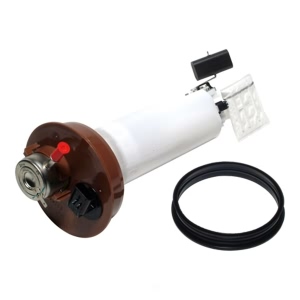

Denso® Fuel Pump Module
PartNumber: 953-3015$167.11Product Specifications- Gaskets Included: Yes
- Internet Product Code (IPC): 806B730BABB
- Item Grade: Premium Replacement
- Item has MSDS (SDS): Y
- MFG Brand Name: DENSO Auto Parts
- MFG Model # (Series): 953-3015
- MFG Name: DENSO
- Package Contents: Fuel Pump Module
- Supplier Company Name: DENSO
- Universal Or Specific Fit: Specific
- UPC: 042511105805
- Part Description: Fuel Pump Module
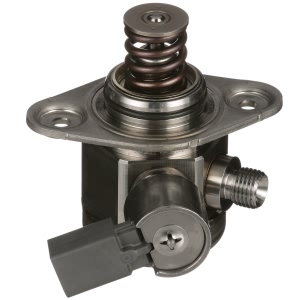
 $2342.15Product Specifications
$2342.15Product Specifications- Drive Shaft Included: No
- Fuel Type: Gas
- Gasket or Seal Included: No
- Housing Color: Silver
- Housing Material: Metal
- In Tank or External: External
- Inlet Fitting Thread Size: M14-1.5mm
- Inlet Type: Threaded
- Item Grade: Standard Replacement
- Mounting Hardware Included: No
- Outlet Fitting Thread Size: M14-1.5mm
- Outlet Quantity: 2
- Outlet Type: Threaded
- Package Contents: Direct Injection High Pressure Fuel Pump, Instruction Sheet
- Pump Type: Mechanical
- Terminal Gender: Male
- Terminal Quantity: 2
- Terminal Type: Blade
- UPC: 689604290736
- Wiring Harness Included: No
- Part Description: Direct Injection High Pressure Fuel Pump
OEM (Genuine) Fuel Pump
PartNumber: 23100-39336$104.29 MSRP:$151.52You Save: $47.23 (32%)Product Specifications- Other Names: Fuel Pump
- Item Dimensions: 11.7 x 6.8 x 5.3 inches
- Item Weight: 1.60 Pounds
- Fitment Type: Direct Replacement
- Replaces: 23100-39335
- Part Description: Fuel Pump
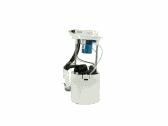

Autobest® Fuel Pump Module Assembly
PartNumber: F2750A$161.17Product Specifications- Average Current Draw(A): 12.5
- Average Flow Rating(GPH): 42.2
- Connector Gender: Male
- Connector Quantity: 1
- Connector Shape: Rectangle
- Country of Orign: China
- Fuel Filter Included: Yes
- Fuel Sending Unit Included: Yes
- Fuel Tank Pressure Sensor Included: No
- Gasket or Seal Included: Yes
- Gasket Or Seal Material: NBR
- Grade Type: Regular
- Housing Material: POM
- In Tank or External: In Tank
- Inlet Size: 0.433
- Inlet Type: Strainer
- Installation Warnings: No
- Internal Or External Strainer: Internal
- Maximum Pump Pressure (PSI): 58.6
- Minimum Pump Pressure (PSI): 54.5
- Mounting Hardware Included: No
- Negative Ground: Yes
- Outlet Quantity: 1
- Outlet Size: 3/8
- Outlet Type: Quick Connect
- Product Height (in): 6.89
- Product Length (in): 12.4
- Product Width (in): 9.25
- Pump Type: Turbine
- Regulator Included: Yes
- Resistance Ohms Empty: 250
- Resistance Ohms Full: 40
- Strainer Included: Yes
- Terminal Gender: Male
- Terminal Quantity: 4
- Terminal Type: PIN
- UPC: 00072845127501
- Voltage: 12V
- Weight (lbs): 3.3
- Wire Harness Included: No
- Part Description: Fuel Pump Module Assembly
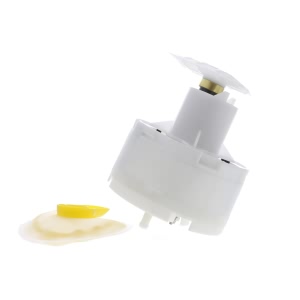

VEMO® Fuel Pump
PartNumber: V10-09-0802-1$121.79Product Specifications- Height [mm]: 115
- Housing Type: with housing
- Length [mm]: 165
- Operating Mode: Electric
- Packaging Depth [cm]: 15,1
- Packaging height [cm]: 11,1
- Packaging width [cm]: 12,7
- Pressure [bar]: 4
- UPC: 884109306085
- Voltage [V]: 12
- Weight [kg]: 0,675
- Width [mm]: 115
- Part Description: Fuel Pump
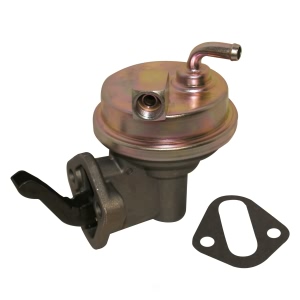

GMB® Mechanical Fuel Pump
PartNumber: 530-8340$55.44Product Specifications- Mounting Hardware Included: 1 PAPER GASKET
- UPC: 083286191785
- Part Description: Mechanical Fuel Pump


Dorman® Fuel Pump Module Assembly
PartNumber: 2630011$180.24Product Specifications- Connector Color: Gray
- Height: 12.5''
- Housing Material: Acetal
- Length: 6.5''
- Lock Ring Included: Yes
- Maximum Flow Rating: 30
- Maximum Pressure: 50 PSI
- OE Part Number: 19180096, 25177108, 25323831
- Outlet Diameter: .375''
- Outlet Quantity: 3
- Outlet Type: Quick Connect
- Seal Included: Yes
- Terminal Gender: Male
- Terminal Quantity: 4
- Terminal Type: Butt
- UPC: 037495559164
- Width: 6.4''
- Wire Gauge Measurement: 14
- Wire Harness Length: 18''
- Wire Quantity: 4
- Part Description: Fuel Pump Module Assembly
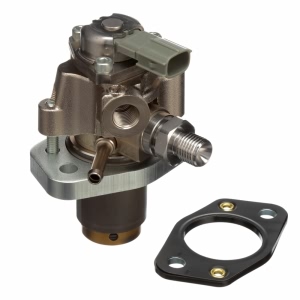

Delphi® Mechanical Fuel Pump
PartNumber: HM10014$2373.07Product Specifications- Drive Shaft Included: No
- Fuel Type: Gas
- Gasket or Seal Included: Yes
- Housing Color: Silver
- Housing Material: Metal
- In Tank or External: External
- Inlet Fitting Thread Size: M14-1.5mm
- Inlet Type: Threaded
- Item Grade: Standard Replacement
- Mounting Hardware Included: No
- Outlet Fitting Thread Size: M14-1.5mm
- Outlet Quantity: 2
- Outlet Type: Threaded
- Pump Type: Mechanical
- Terminal Gender: Male
- Terminal Quantity: 2
- Terminal Type: Blade
- UPC: 689604265543
- Wiring Harness Included: No
- Part Description: Mechanical Fuel Pump
OEM (Genuine) Fuel Pump
PartNumber: BL3Z-9350-D$311.73 MSRP:$476.67You Save: $164.94 (35%)Product Specifications- Other Names: Fuel Pump
- Item Dimensions: 6.4 x 6.2 x 4.5 inches
- Item Weight: 2.40 Pounds
- Fitment Type: Direct Replacement
- Replaces: BL3Z-9350-C, BL3Z-9350-A, BL3Z-9350-B
- Part Description: Fuel Pump


Autobest® Fuel Pump Module Assembly
PartNumber: F1592A$146.08Product Specifications- Average Current Draw(A): 13
- Average Flow Rating(GPH): 60.8
- Connector Gender: Female
- Connector Quantity: 1
- Connector Shape: Rectangle
- Country of Orign: China
- Fuel Filter Included: Yes
- Fuel Sending Unit Included: Yes
- Fuel Tank Pressure Sensor Included: Yes
- Gasket or Seal Included: Yes
- Gasket Or Seal Material: FKM
- Grade Type: Regular
- Housing Material: POM
- In Tank or External: In Tank
- Inlet Size: 0.433
- Inlet Type: Strainer
- Installation Warnings: No
- Internal Or External Strainer: Internal
- Maximum Pump Pressure (PSI): 63.8
- Minimum Pump Pressure (PSI): 58
- Mounting Hardware Included: No
- Negative Ground: Yes
- Outlet Quantity: 1
- Outlet Size: 3/8
- Outlet Type: Quick Connect
- Product Height (in): 7.48
- Product Length (in): 14.06
- Product Width (in): 9.84
- Pump Type: Turbine
- Regulator Included: No
- Resistance Ohms Empty: 182
- Resistance Ohms Full: 8
- Strainer Included: Yes
- Terminal Gender: Male
- Terminal Quantity: 4
- Terminal Type: PIN
- UPC: 00072845115928
- Voltage: 12V
- Weight (lbs): 3.15
- Wire Harness Included: No
- Part Description: Fuel Pump Module Assembly
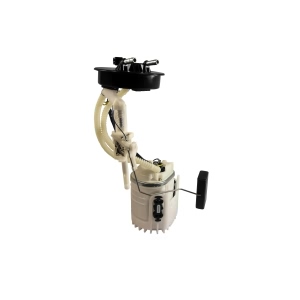

VEMO® In-Tank Electric Fuel Pump
PartNumber: V10-09-0826-1$142.48Product Specifications- Finish: Black
- Part Description: In-Tank Electric Fuel Pump
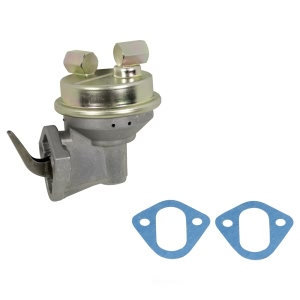

GMB® Mechanical Fuel Pump
PartNumber: 530-8560$42.85Product Specifications- Mounting Hardware Included: 2 BOLTS, 2 WASHERS, 1 PAPER GASKET
- UPC: 083286195127
- Part Description: Mechanical Fuel Pump
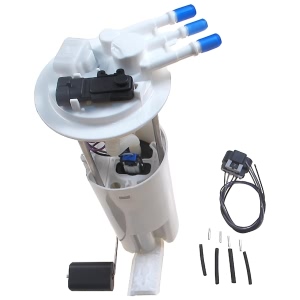

Dorman® Fuel Tank Sending Unit
PartNumber: 2630371$178.79Product Specifications- Connector Color: White
- Connector Gender: Female
- Connector Shape: Flat Plug
- Height: 230 mm
- Housing Length: 184 mm
- Housing Material: Plastic (Polybutylene Terephthalate)
- Housing Width: 94 mm
- Inlet Diameter: 9.49 mm
- Inlet Type: Male
- Length: 19.5 mm
- Lock Ring Included: No
- Maximum Flow Rating: 97 LPH
- Maximum Pressure: 0.8 MPA
- OE Part Number: 19177237, 25316320
- Outlet Diameter: 9.49 mm
- Outlet Quantity: 1
- Outlet Type: Male
- Seal Included: Yes
- Terminal Gender: Female
- Terminal Quantity: 4
- Terminal Type: Spade
- Top Mount Diameter: 6.35 mm
- Universal Or Specific Fit: Specific
- UPC: 747214154395
- Width: 6.35 mm
- Wire Gauge Measurement: 1.5 AWG
- Wire Quantity: 4
- Part Description: Fuel Tank Sending Unit
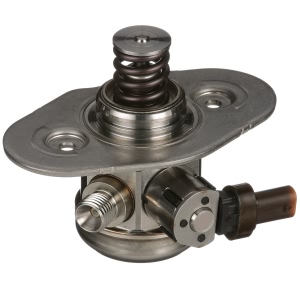
 $2296.22Product Specifications
$2296.22Product Specifications- Drive Shaft Included: No
- Fuel Type: Gas
- Gasket or Seal Included: No
- Housing Color: Silver
- Housing Material: Metal
- In Tank or External: External
- Inlet Fitting Thread Size: M14-1.5mm
- Inlet Type: Threaded
- Item Grade: Standard Replacement
- Mounting Hardware Included: No
- Outlet Fitting Thread Size: M14-1.5mm
- Outlet Quantity: 2
- Outlet Type: Threaded
- Package Contents: Direct Injection High Pressure Fuel Pump, Instruction Sheet
- Pump Type: Mechanical
- Terminal Gender: Male
- Terminal Quantity: 2
- Terminal Type: Blade
- UPC: 689604291108
- Wiring Harness Included: No
- Part Description: Direct Injection High Pressure Fuel Pump
- $595.02 MSRP:
$847.62You Save: $252.60 (30%)Product Specifications- Other Names: Fuel Pump
- Item Dimensions: 11.0 x 8.0 x 6.0 inches
- Item Weight: 3.30 Pounds
- Fitment Type: Direct Replacement
- Part Description: Pump Assembly, Fuel High Pressure


Autobest® Fuel Pump Module Assembly
PartNumber: F4696A$138.63Product Specifications- Average Current Draw(A): 8.5
- Average Flow Rating(GPH): 30.4
- Connector Gender: Male
- Connector Quantity: 1
- Connector Shape: Racetrack
- Country of Orign: China
- Fuel Filter Included: No
- Fuel Sending Unit Included: Yes
- Fuel Tank Pressure Sensor Included: No
- Gasket or Seal Included: No
- Gasket Or Seal Material: FKM
- Grade Type: Regular
- Housing Material: POM
- In Tank or External: In Tank
- Inlet Size: 1.763
- Inlet Type: Strainer
- Installation Warnings: No
- Internal Or External Strainer: Internal
- Maximum Pump Pressure (PSI): 108.8
- Minimum Pump Pressure (PSI): 79.8
- Mounting Hardware Included: No
- Negative Ground: No
- Outlet Quantity: 1
- Outlet Size: 5/16
- Outlet Type: Quick Connect
- Product Height (in): 4.8
- Product Length (in): 7.28
- Product Width (in): 6.3
- Pump Type: Turbine
- Regulator Included: No
- Resistance Ohms Empty: 60
- Resistance Ohms Full: 290
- Strainer Included: Yes
- Terminal Gender: Male
- Terminal Quantity: 4
- Terminal Type: PIN
- UPC: 00072845146960
- Voltage: 12V
- Weight (lbs): 3.16
- Part Description: Fuel Pump Module Assembly
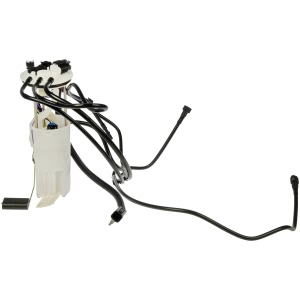

Dorman® Fuel Tank Sending Unit
PartNumber: 2630329$150.35Product Specifications- Connector Color: Black
- Connector Gender: Female
- Connector Shape: Square
- Height: 304 mm
- Housing Length: 168 mm
- Housing Material: Plastic (Polyoxymethylene)
- Housing Width: 92 mm
- Inlet Type: Jet
- Length: 600 mm
- Lock Ring Included: No
- Maximum Flow Rating: 180 LPH
- Maximum Pressure: 110 PSI
- OE Part Number: 19180098, 25323841, 25312608, 25180275, 25323829
- Outlet Diameter: 3/8''; 5/16''; 5/16''; 5/16''; 1/4''
- Outlet Quantity: 5
- Outlet Type: Female; Female; Female; Male; Female Quick Connects
- Seal Included: Yes
- Terminal Gender: Male
- Terminal Quantity: 4
- Terminal Type: Spade
- Top Mount Diameter: 112.5 mm
- Universal Or Specific Fit: Specific
- UPC: 747214303298
- Width: 154 mm
- Wire Gauge Measurement: 15 AWG; 17 AWG
- Wire Harness Length: 595 mm
- Wire Quantity: 7
- Part Description: Fuel Tank Sending Unit
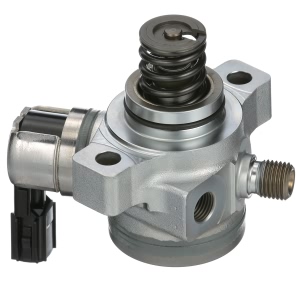
 $2261.46Product Specifications
$2261.46Product Specifications- Drive Shaft Included: No
- Fuel Type: Gas
- Gasket or Seal Included: No
- Housing Color: Silver
- Housing Material: Metal
- In Tank or External: External
- Inlet Fitting Thread Size: M12-1.0mm
- Inlet Type: Female Threaded
- Item Grade: Standard Replacement
- Mounting Hardware Included: No
- Outlet Fitting Thread Size: M14-1.5mm
- Outlet Quantity: 2
- Outlet Type: Threaded
- Pump Type: Mechanical
- Terminal Gender: Male
- Terminal Quantity: 2
- Terminal Type: Blade
- UPC: 689604285886
- Wiring Harness Included: No
- Part Description: Direct Injection High Pressure Fuel Pump
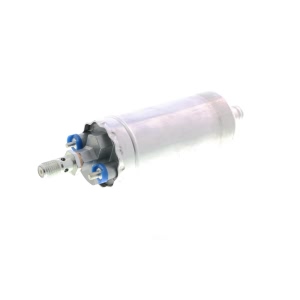

VEMO® Fuel Pump
PartNumber: V30-09-0002$125.39Product Specifications- Height [mm]: 52
- Length [mm]: 52
- Operating Mode: Electric
- Packaging Depth [cm]: 7,8
- Packaging height [cm]: 7,8
- Packaging width [cm]: 24,3
- Pressure [bar]: 4
- Supplementary Article/Info 2: with mounting parts
- Weight [kg]: 0,79
- Width [mm]: 197
- Part Description: Fuel Pump
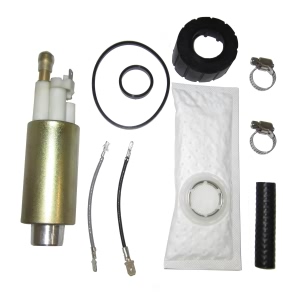

GMB® Fuel Pump and Strainer Set
PartNumber: 520-1101$36.80Product Specifications- Fuel Sending Unit Included: No
- Fuel Type: Gasoline
- Maximum Flow Rating: 90
- Maximum Pressure: 90
- UPC: 083286190498
- Part Description: Fuel Pump and Strainer Set
OEM (Genuine) Fuel Pump
PartNumber: 23221-46010$270.08 MSRP:$392.37You Save: $122.29 (32%)Product Specifications- Item Dimensions: 12.3 x 6.2 x 5.8 inches
- Item Weight: 1.20 Pounds
- Part Description: Fuel Pump
About Fuel Pump
A fuel pump is an essential piece of equipment which helps carry fuel from the tank to the device on the vehicle that regulates the fuel/air mixture. It generally comes accompanied by a fuel filter which helps eliminate any pollutants that can be stuck in your fuel lines, fuel tank, or pump itself. The capacity of a fuel pump is measured in psi meaning pounds per square inch. The two most common fuel pump types used on vehicles are mechanical fuel pumps and electric fuel pumps.
Mechanical Fuel Pump:A mechanical fuel pump is mainly used on engines which rely on a carburetor to deliver the air/fuel mixture into the combustion chambers. They are mainly used on older model engines from the 1950's to the 1980's as they only used from 5psi to 15 psi. A mechanical fuel pump is a low pressure pump generally located bolted directly on the engine block or the cylinder head (varies per engine).
This style fuel pump has a lever on the pump that actuates by riding on the eccentric lobe on the camshaft. The movement of the lever builds vacuum which helps draw the fuel from the tank and into the feed line for the carburetor. The flow of the fuel is controlled by a check valve which ensures that it only flows in one direction.
Electric Fuel Pump:An electric fuel pump is used on newer engines which rely on fuel injection to deliver the air/fuel mixture into the combustion chamber. The fuel injection system requires fuel pumps which can push out up to 60 psi (varies amongst engines) from the fuel tank into the lines up to the engine. An electric fuel pump is generally mounted in the tank but can be mounted on the outside of the tank as well. The electric fuel pumps helps take an accessory load off the engine and helps reduce the amount of fuel that is being consumed. Most vehicles come with two fuel pump one being a low pressure pump and the other being a high pressure pump.
Electric fuel pumps are mostly ran off an ECU or PCM which help regulate when the pump shuts off and when it comes on. The power train control module looks for a signal from the camshaft so that the relay is charged and it sends a signal to the fuel pump which will help pressurize the system.
Common Issues when fuel pump goes badA bad fuel pump can cause stressful issues including poor fuel economy, loss of acceleration, and hard/ no starting. Advancements in the fuel pump have made vehicles more environment friendly, while pushing out the same performance. The benefits of the pump have allowed for the consumer to enjoy a vehicle that is only getting better.

